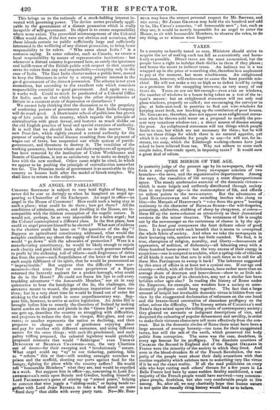TAXES.
IN a country so heavily taxed as ours, Ministers should strive to acquire the art of making each tax fall as conveniently and harm- lessly as possible. Direct taxes are the most economical, but the people have a right to indulge their dislike to them if they please ; and hence the resort to indirect taxes. An indirect tax is a tax wrapped up in the price of something else,therefore less unpleasant to pay at the moment, but more mischievous. An enlightened statesman, however, will endeavour to cause the least possible mis- chief. Ile will not make a tax so high as to defeat itself by acting as a premium for the smuggling interests; as very many of our taxes do. Taxes on use are fair enough— even a tax on windows, the number of windows in a house being taken as a test of the te- nant's means : but an enlightened statesman will tax only real glass windows, properly so called; not encouraging the surveyor to play at hide-and-seek in pantries to find out wire-windows for keeping meat fresh, nor blocking up the ventilation of poor houses. Mr. GOULBUEN, therefore, does not appear as an enlightened states- , man when he throws cold water on a proposal to modify the pre- sent very vexatious window-tax ; a direct source of disease among the poor. An enlightened statesman will tax things which people desire to use, but which are not necessary for them ; but he will not tax those things for which there is no natural appetite, yet which it is very desirable for people to use—he will not, for in stance, tax soap, which the Edinburgh working-classes have just asked to have relieved from tax. Why not adhere to some such simple rules, Free-trade apart, in imposing taxes ? It would save a great deal of odium.


























 Previous page
Previous page